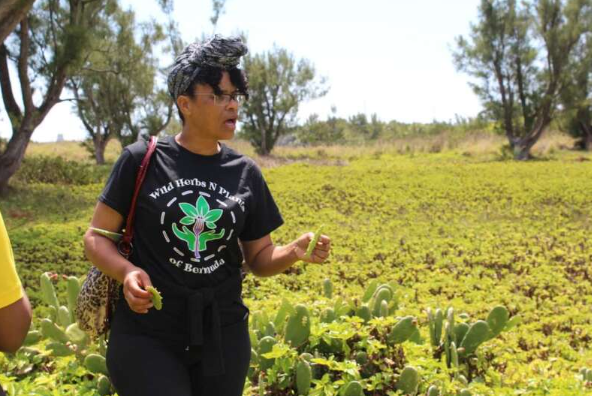Those plants you are walking past could be food; they could be the remedy to what ails you. Or they might be something you should steer clear of.
Doreen Williams-James follows a plant-based diet using knowledge about Bermuda’s flora passed down through her grandmother.
The 56-year-old is convinced it is what has kept her healthier than many of her peers and that the food she makes is responsible for reversing her father’s diabetes.
On Sunday she’s teaching about wild-food foraging as part of a Greenrock initiative to engage the community in nature and environmental activities.
Anyone who joins will learn how to identify wild plants that have medicinal and/or nutritional benefits. Ms Williams-James will also give tips on how to cook them.
As the funeral director of Alpha Memorial Chapel, she has seen how badly things can go with an unhealthy diet.
“I see a lot of deaths from poor choices of lifestyle. So that's why I feel it's important to share the information and the knowledge that I have to help people have a better quality of life and to make better choices when it comes to their lifestyle,” she said.
Her 87-year-old father is a double amputee who once had hypertension and diabetes but has been able to stop his prescriptions because of the plant-based diet he now follows.
“That's what I also mention on my tours, that it's all about what you put in your mouth, what you put in your body, how you treat your body. And he’s a living testimony,” Ms Williams-James said.
“He had issues from being diabetic, having hypertension. He’s a double amputee and today he's not on any pharmaceutical medications because of his plant-based diet. That’s what he eats. And most of what I forage is what I give him for his food.”
She began researching about the benefits and “did some studying as well” to build on the knowledge passed on through her family.
“It’s proven. I mean, my father is a living testimony and I can even say for myself. I'm 56 years old and I'm not on any type of medications; most people my age have been diagnosed with hypertension. So it's important for us to know what we can do to heal our bodies. Your body heals according to the conditions you give it.”
Ms Williams-James believes that people have started to appreciate that type of thinking more as a result of the pandemic. Since then, people seem more intent on following a “holistic lifestyle” and having “a healthier lifestyle”.
For her grandmother wild plants were a necessity because she had 12 children to feed but “eating from the land” was a common practice at that time.
“If you talk to the older generation, they can tell you a lot about the plants that healed them, the natural remedies they used. It's coming back, but there's still a lot of that knowledge that is being lost. So I feel it's very important to be able to educate people,” Ms Williams-James said.
“I never met my grandmother but a lot of what she taught her children was passed on to my father – he taught me a lot and my aunts as well. But for [my grandmother] at that time, it was basically just trying to feed her children.”
Scurvy-grass is edible raw and cooked. Its leaves are rich in vitamin C; wild spinach, which is also high in vitamins C, A and K, folate and other nutrients, can be eaten raw in salads or added to smoothies and juices.
Most people are more familiar with drinking stinging nettle as a tea but the leaves can be juiced, or sautéed and eaten as greens. Wild mustard leaves can be used in a salad or sautéed and eaten as greens; nasturtium leaves are useful in a salad, can be cooked in a soup or used to make other dishes. The flowers are edible as well; the seeds “help to kill the parasites in your body”, Ms Williams-James said.
Prickly pear, which is coming into season, is “very high in antioxidants and flavonoids”.
“So you can make a drink with it and you can also eat the tuna pads, the thick cactus, you can eat them as well; just pick it and scrape off the stickers and eat it like it is. The juice is very good for preventing inflammation; if you're diabetic, it helps to lower the glucose levels,” she said.
Many people would be surprised to learn just how easy it is to “find plants to eat all year round”.
“It's just amazing. The local cherries and the loquats are what most children grow up being familiar with but when you really get into what's available, it will blow your mind. It's just amazing.”
She felt Greenrock was a good charity to align her ideas with because it was also focused on the environment.
“It's just showing people the importance of what is available to them but also learning how to respect the environment as well,” Ms Williams-James said.
“If you trash the Earth, if you trash your environment and then if you decide to eat from the land, then you're eating from a dirty environment. Why would you want to eat dirty food? So, it's also about educating people on keeping the environment clean, respecting what's been given to us and respecting nature.”
In that vein, she added, it is important to “take only what you need”.
“Don't be excessive. Don't be pulling up roots and killing off plants. You want that to come back again the following year to feed you, to heal you. It's about sustainability as well.”
• Join Greenrock and Wild Herbs N Plants of Bermuda on Sunday at Cooper’s Island Nature Reserve from 2pm to 4pm. Admission is free for Greenrock members; $25 for non-members. Register here: https://t.ly/a_peh. For more information visit greenrock.org or call 747-7625. Follow @bdawildherbs on Instagram


